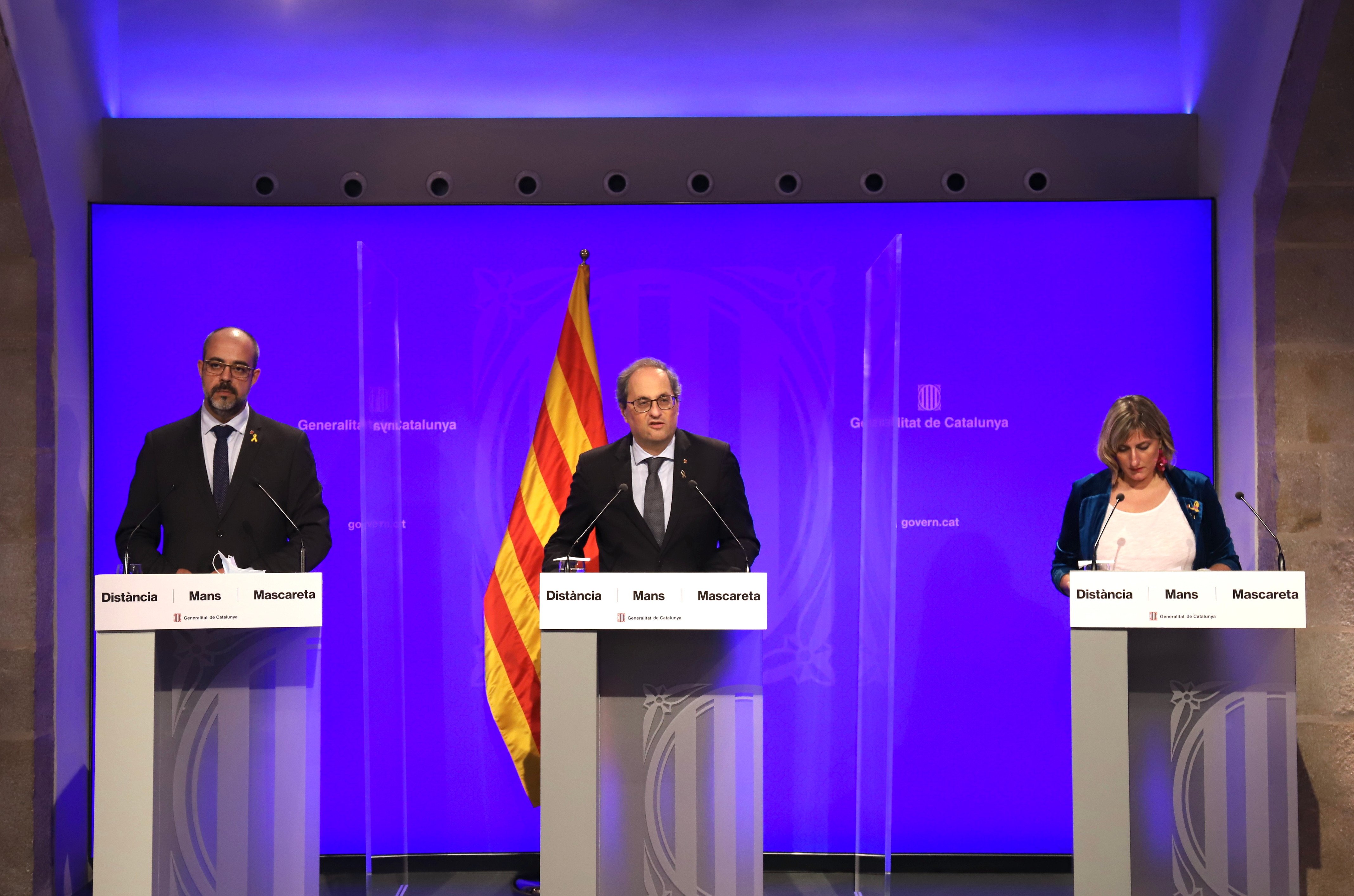With the entry of the entire territory of Catalonia into Phase 3 of coronavirus de-escalation, the Catalan government has recovered the powers that were centralized by the Spanish executive when the crisis began and it has decreed that from midnight this Thursday night, the measures applied via Spain's state of alarm will no longer be in effect. The Catalan president, Quim Torra, thus announced the entry into a new "recovery stage", which includes the lifting of restrictions on movement within Catalonia.
Torra and the Catalan ministers of health, Alba Vergés, and interior, Miquel Buch, appeared to explain the decree and the conditions laid down by Procicat, the Catalan Civil Protection emergency committee which from now on will regulate special measures applying to the pandemic.
Until June 25th, capacity restrictions on indoor and outdoor space will be maintained: 50% of normal maximum capacity will be allowed in enclosed spaces and 75% in open spaces. But from that date onward, the principle that will guide the regulation will be maintainence of social distancing. "Everyone can identify, when they enter a place, whether social distancing is being respected or not, whether people are crowded or not. When we get into too many rules and restrictions, reality ends up drowning us," argued Vergés. "It's a complete change of concept, which we have been demanding for days".
The government assures that with the new regulations "there will be an improvement in clarity". "The phases are over, this tangle that has been imposed on us," said Vergés.
Safety distance of 1.5m, safety area of 2.5m2
As a general rule, percentages of maximum capacity permitted will not be set down after June 25th, but instead, a very general rule linking the estimate of capacity to the necessary safety distance. In general, 1.5 metres of distance between people, or a safety area of 2.5 square metres per person, as organizational measures that anyone can adapt to their spaces or premises. The responsibility will lie with the public, the organizations and those responsible for the management of the space, the minister stated.
For enclosed areas, those in charge are asked to sectorize spaces, with different entry and exit points, guaranteed hygiene measures and compulsory use of masks. The basic rule is to avoid congestion in all spaces whether small or large, closed or open.
According to president Torra, along with social distancing, the use of masks and personal hygiene will continue to be the basic elements of coronavirus safety. "The public need to adopt the measures to avoid risks," he said. These measures include: frequent hand washing: avoidance of coughing directly into the air or touching one's face, nose and eyes; maintaining stable regular groups of people with whom you share your life, minimizing daily social contacts to avoid the multiplication of possible transmission chains, a preference for outdoor spaces, the cleaning and disinfection of surfaces, and others."
He stressed that anyone with coronavirus symptoms should contact the health system. "We have not yet overcome the threat of Covid-19," warned Quim Torra, calling for maximum protection and urging solidarity with the rest of society and, in particular, with the most vulnerable groups.
Catalan government decree: "Taking effect at 0.00 hours on 19th June 2020, the end of Phase 3 of the Covid-19 pandemic de-escalation plan for the whole of Catalonia."
Health minister Vergés stressed that whether this new situation functions well depends "absolutely" on people's behaviour. "Catalonia has behaved in a way that is more than exemplary for these three months, when it has come to asking people to stay in lockdown," she reiterated.
Essential to the regulations being applied as of today, according to Vergés, is the mandatory continued use of masks when people are indoors or when safety distances cannot be guaranteed, with a preference for outdoor activities also being recommended. “We can do everything, but we have to show solidarity with the people who are the most vulnerable,” she repeatedly insisted. Children's playgrounds will be able to open but "with maximum responsibility, distancing, and masks".
Questioned by reporters, Torra admitted that, with regard to the opening of schools in September, the "formidable challenge" is to ensure face-to-face teaching in classrooms. “Our boys and girls will start school and they will be physically there,” he assured.
The minister Vergés said that the public health system had emerged from this crisis strengthened and that the Catalan health service is aiming to have the capacity to detect new outbreaks that may arise as soon as they appear. She repeated that the virus has not disappeared. However, she explained that the response to a new outbreak does not have to be a new lockdown.
In this regard, though, Torra assured that he will not hesitate to take the measures that are necessary in the health crisis.
Asked about the last three months, he insisted that it would have been better if the Spanish government had not centralized powers. "It seems to us that it could have done in a very, very different way. We have always been making proposals," he insisted, "I think a different type of state of alarm was possible."

